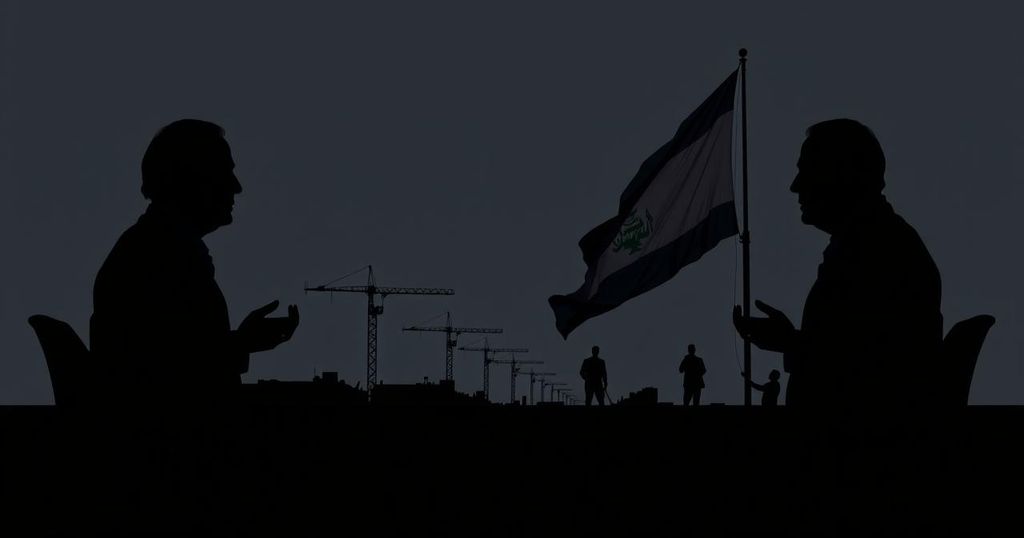Biden and Macron Urge for Ceasefire Amidst Conflict in Lebanon
President Biden and French President Emmanuel Macron called for a temporary ceasefire between Israel and Hezbollah amidst heightened violence along the Israeli-Lebanese border, resulting in over 700 casualties. This joint statement aims to facilitate diplomatic negotiations and prevent further escalation. The initiative has garnered support from various nations, indicating a broad international commitment to restoring peace in the region.
On Wednesday, President Joe Biden and French President Emmanuel Macron jointly issued a statement urging Israel and Hezbollah to agree to a temporary ceasefire to facilitate negotiations aimed at resolving the ongoing crisis on the Israeli-Lebanese border. This call for a ceasefire follows ten days of intense hostilities that have resulted in over 700 casualties in Lebanon, heightening concerns over a potential escalation, particularly an Israeli ground invasion targeting Hezbollah militants near the border. The initiative is part of a broader diplomatic effort, with the Biden administration collaborating with France and several other nations to establish a “pause” in the conflict, which may pave the way for renewed negotiations concerning a ceasefire and the status of hostages in Gaza. President Biden and President Macron discussed this diplomatic initiative during their meeting on the sidelines of the UN General Assembly prior to releasing their joint statement calling for the ceasefire. In their statement, they emphasized the urgent need for a resolution: “It is time for a settlement on the Israel-Lebanon border that ensures safety and security to enable civilians to return to their homes. The exchange of fire since October 7th, and in particular over the past two weeks, threatens a much broader conflict, and harm to civilians. We therefore have worked together in recent days on a joint call for a temporary ceasefire to give diplomacy a chance to succeed and avoid further escalations across the border.” The call for a ceasefire has received support from various nations, including Australia, Canada, several European Union member states, and several Middle Eastern nations, indicating a significant international backing for this initiative. Discussions that led to this initiative began with a telephone conversation between U.S. National Security Adviser Jake Sullivan and Israeli Minister of Strategic Affairs Ron Dermer. Subsequently, U.S. officials conducted talks with French representatives, alongside consultations with Israeli, Lebanese, and other Arab nations, creating a multilateral approach to address the escalating tensions. Furthermore, Secretary of State Antony Blinken engaged with Gulf foreign ministers, securing their support for the proposed ceasefire initiative. This development reflects a concerted effort by key global leaders to restore peace and stability in a region marked by prolonged tension and conflict.
The context of this initiative stems from escalating violence along the Israeli-Lebanese border, primarily involving the militant group Hezbollah and Israeli forces. The recent conflict, ignited on October 7th, 2023, has led to significant casualties and humanitarian crises, prompting international leadership to seek a resolution. The proposal for a ceasefire signifies an acknowledgment of the risks posed by ongoing hostilities, including potential broader regional conflicts. As the situation involves multiple actors and interests, the joint statement by Presidents Biden and Macron aims to unify international efforts toward a peaceful resolution and diplomatic engagement.
In conclusion, the call for a temporary ceasefire by Presidents Biden and Macron is a critical diplomatic move aimed at halting renewed violence in Lebanon and facilitating peace talks. Supported by an array of international actors, this initiative seeks to create conditions conducive to negotiation and address the urgent humanitarian needs arising from the prolonged conflict. By prioritizing diplomacy, the leaders aspire to prevent further escalation and ensure the safety and security of civilians in the region.
Original Source: www.axios.com




Post Comment